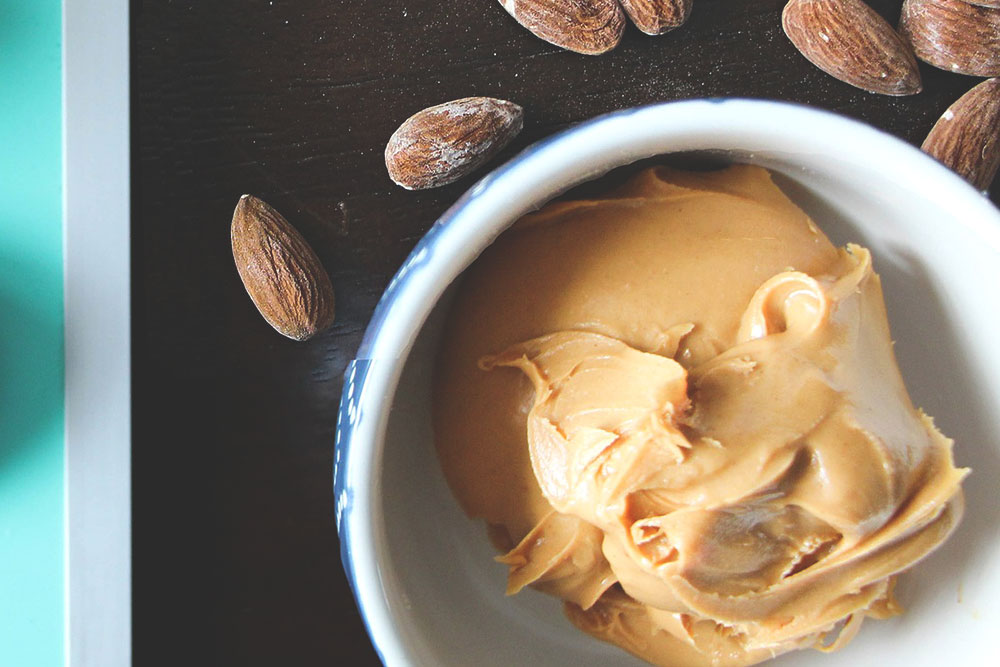Nut butters are back indeed, but take a good look at the label for these key ingredients before your purchase. Its impact on both your health and environment may be more than you think.
BY: MASCHA DAVIS, MPH, RDN
Delicious, creamy, nutritious nut butter… it’s now common knowledge that its high content of healthy fats are not to be feared. In fact, these fats are essential to health, energy, and weight management. It may sound counterintuitive at first, but getting plenty of good fats in your diet is important for satiety, which helps control cravings and stabilize blood sugar levels.
Research shows that polyunsaturated fatty acids (PUFAs), found in many nuts, such as walnuts, may enhance metabolic activities in the body that helps build lean tissue and reduce obesity. But hold on a second before you run out and grab any jar that looks like nut butter at the store! It’s actually important that you know what to avoid, just as much as you know adding nuts and nut butter is helpful to a healthy, balanced diet.
So what should you consider when you’re selecting a nut butter?
Some containers may advertise themselves as the healthy option through ‘natural’ or ‘organic’ labels, but may have ingredients that are harmful to both your health and the environment. Keep in mind that pretty much anything added (other than perhaps some salt) is totally unnecessary. All you need are nuts to make the perfect nut butter! What are the red flags to look for? Here’s what you should consider:
1. Hydrogenated oils
This processed fat which has been linked to atherosclerosis, or hardening of the arteries, is added to make foods more shelf stable. It’s what makes nut butter spreads, like Jiff and Skippy, thick, creamy and able to sit on a shelf for a year or more before going bad. These oils have been linked to weight gain and heart problems.
2. Palm oil
We’ll get to palm oil’s environmental impact in a second, but health wise, these are not needed in your nut butter. Even organic and natural products still use palm oil, so read the label! Added hydrogenated or palm oil is a non-whole food source of added fats, which can add up quickly and are not beneficial for those who are trying to manage their weight and health.
3. Sugar
That means any sweetener so watch out for common sugar additives such as ‘brown sugar, honey, or maple syrup’, which simply add extra calories and spike your blood sugar. There is natural sweetness and flavor in all nuts and seeds, so any sweetener added is an unnecessary adulteration.
So back to the issue of palm oil…how is it exactly harming the environment?
The truth is, palm oil is decimating the environment and destroying the habitat of many animals.
Palm oil is a popular ingredient in many packaged and fast foods, personal care and cosmetic products, and household cleaners. Driven by demand for these products, palm oil production has nearly doubled in the past 15 years. Almost all oil palm grows in areas that were once tropical moist forests, some of them quite recently. The conversion to date, and future expansion, threatens biodiversity and increases greenhouse gas emissions.
According to one study performed by researchers at Stanford and Yale universities, emissions from the palm oil industry alone are projected to release 558 million metric tons of carbon dioxide — more than the national emissions of Canada — by 2020. Everything in our Earth’s ecosystem is interconnected, and this is no different. These greenhouse gas emissions and the destruction of forests are contributing factors to climate change. By reading labels and making conscious choices, you can make sure that your nut butter snack isn’t doing more harm than good.
Because of its high demand and implications for the environment, there is a growing call-to-action for sustainable palm oil. However, without a more transparent way to see where palm oil is sourced from, environmental groups advise avoiding palm oil use as much as possible. While this may be difficult, reading labels is a good start, and avoiding it in products that don’t need it in the first place – like nut butters.
Luckily, there is momentum in the right direction.
In 2008, a non-profit group called the Roundtable on Sustainable Palm Oil (RSPO) developed a set of environmental and social criteria which companies must comply with in order to produce Certified Sustainable Palm Oil (CSPO). By working to unite stakeholders from various sectors of the palm oil industry, the hope is to develop and implement global standards for sustainable palm oil.
One of the most important RSPO criteria states that primary forests or areas where significant concentrations of biodiversity (e.g. endangered species), fragile ecosystems, and other high conservation value areas which are fundamental to meeting basic or traditional cultural needs of local communities, cannot be cleared.
Learn more and search for certified products here.
Mascha Davis, MPH, RDN is a Los Angeles-based private practice dietitian who shares her love of health and wellness through a unique global perspective. From world-class U.S. medical centers to rural villages in Africa, Mascha has dedicated herself to traveling the world, spreading her love of healthy living through both her humanitarian work and private practice. Learn more about Mascha at Nomadista Nutrition.

